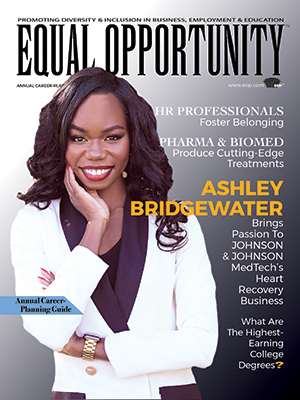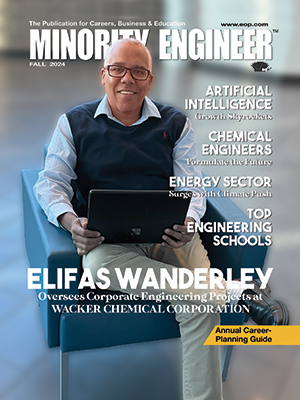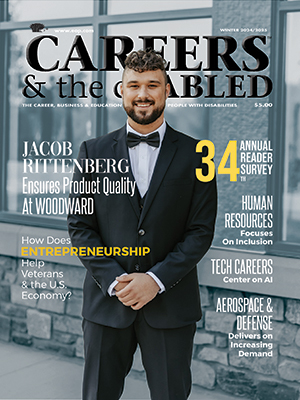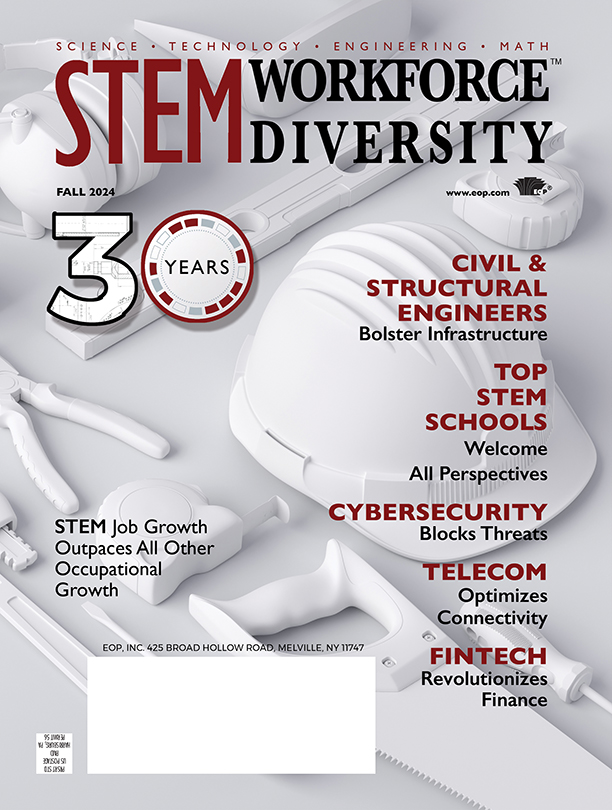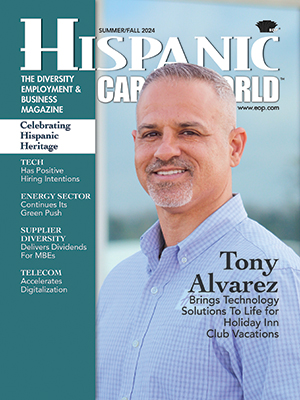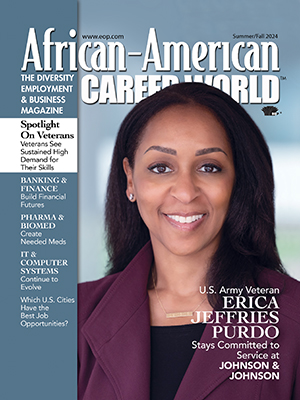By Katie McKy
Diversity leaders who emphasize inclusivity and facilitate a welcoming workplace culture for people with disabilities (PWDs) are in the spotlight for their efforts and execution.
Lieberman Elevates Wells Fargo’s Neurodiversity Program
Today Alex Lieberman is a business technology analyst for Wells Fargo & Company, but not that long ago, he feared he’d reached a dead end, with no career and no prospects.
“I was 27, a published author with a master’s degree, and I’d never held down a job for more than a few weeks,” he reveals.
He applied to Wells Fargo, not out of aptitude nor interest, but out of desperation. “I was past the point of caring,” he admits, “but Stephen DeStefani, the program manager, spotted my skills and brought me on as a subject-matter expert and community organizer.”
His world shifted. “Instead of getting fired from part-time tutoring positions, I now speak at conferences and negotiate with executives. I’m still the same person as I was before, but that opportunity completely changed my life,” he reflects.
As a result of this positive, life-changing career opportunity interaction with DeStefani, the company’s enterprise neurodiversity program executive, Lieberman is also the Wells Fargo Neurodiversity Program’s subject-matter expert and community enrichment lead in addition to being a business tech analyst.
“I lead several internal support programs, consult on expansions and changes to the program overall, and counsel and direct participants in need to those who can help them,” he explains about his neurodiversity advocacy role at Wells Fargo.
For Lieberman, tapping the talents of workers with disabilities is necessary by the numbers. “By government estimates, about 27% of Americans have some kind of disability with a 7.2% unemployment rate. That works out to about 6.5 million Americans with disabilities without jobs, not counting underdiagnosis and underemployment, a massive pool of unexplored talent waiting for an opportunity. I lived it,” he shares.
Lieberman is proof that Wells Fargo wants to do the best by its employees. “Well Fargo values bringing your whole self to work.”
If you’re hired by Wells Fargo, then you’ll find other professionals in similar situations who collaborate to powerful effect. “We organize, communicate, and support each other, and we have enough influence and a friendly enough relationship with management to make our voices heard. Many companies wouldn’t look kindly at this kind of push back, but Wells Fargo integrates our efforts into theirs, and helps us actually make a difference,” he elaborates.
Lieberman’s disability can disrupt his work day, but Wells Fargo has provided accommodations. “My skills are mostly around research and communications, but I work in bursts and cannot stare at a computer for hours straight. At previous positions I’d either burn out, or be spotted taking breaks and let go despite my accomplishments,” he adds.
At Wells Fargo, Lieberman has the freedom to work at his own speed and comfort level without worrying about judgment. “I’m allowed to move at my own speed, to not do well at things I can’t do, and to make my mark in the places I excel,” he points out.
Lieberman isn’t passive in pursuing his successes either. “I regularly talk to others with similar experiences within the company and help build my network.”
Lieberman has also been welcomed by colleagues without similar challenges. “People here are kind. Of course, there are always politics, and there are always issues, and I wouldn’t claim the company is perfect, but people here tend to shy away from hostile behavior and work together. A lot of employees have worked at the bank for decades, and there’s a reason they stay,” he concludes.
Learn about San Francisco, CA-headquartered Wells Fargo via Facebook, LinkedIn, X, Pinterest, YouTube and Instagram. Explore careers and the Wells Fargo Neurodiversity Program at wellsfargojobs.com and wellsfargo.com/about/careers.
Sorensen Takes the Lead in Neuro Challenges at Autodesk
Kassidi Sorensen, Autodesk MIND Network global lead and senior content manager, was diagnosed with ADHD relatively late in her life.
“I was diagnosed with ADHD in my junior year of college,” Sorensen reveals, also admitting the diagnosis walloped her.
“I always describe my experience being diagnosed late as feeling like the stages of grief, which I’ve also experienced before. I remember feeling denial, sadness when reflecting on my younger self, anger in realizing I’d spent so many years masking to get by, but eventually, acceptance,” she shares.
Her acceptance evolved into much more at Autodesk. “My experience at Autodesk took this a step farther and brought me from a place of acceptance around my diagnosis to a place of empowerment,” she reflects.
That’s because in addition to now being a senior content manager, and to formerly being an employer brand manager, a role in which she learned about her colleagues’ unique stories and gave them a platform to share these stories and attract new talent, she’s also the founder and global lead of one of Autodesk’s nine employee resource groups (ERGs), the Autodesk MIND Network, which supports mental inclusion, neurodivergence, and disability (MIND).
“As an ERG lead, my role is to define our goals and objectives each year while ensuring alignment with Autodesk’s overarching diversity and belonging strategy, as well as Autodesk MIND Network’s mission: provide resources, support, and advocacy to employees who struggle with mental health, are neurodivergent, or have a disability.”
Sorensen also leads a global board, an extended leadership team within MIND Network. Her leadership roles shifted her self-perception.
“Autodesk has empowered me by giving me the platform to serve our disability and neurodivergent community as its global lead. Through this role, I’ve had so many opportunities I would’ve never imagined otherwise,” she remarks.
She spoke on a panel about disability allyship at Autodesk University, the company’s largest conference, and had conversations with members of the C-suite staff about inclusion for people with disabilities (PWDs).
“I have a dedicated seat at the table and opportunity to consult for key initiatives that shape the future of our company,” she notes about her disability advocacy role at the company.
Autodesk empowers all of its inclusive workforce by supporting the MIND Network via annual funding, backing of an executive sponsor, and more, according to Sorensen. “With this support, the MIND Network is able to host programming and events.”
Autodesk’s employee assistance program also provides employees and their families with care for emotional and mental health, along with resources to support life issues, financial services, family issues, work matters, and legal services.
“Our global wellness reimbursement program allows employees to submit expenses for reimbursement that support their physical, emotional, financial, and sustainable wellness,” she details.
Autodesk employees also have access to RethinkCare, a global benefit supporting neurodivergent individuals or parents/caregivers/allies to neurodivergent individuals, which includes expert consulting, learning modules, self-help resources, and more.
“There’s also free coaching through Bravely, a global benefit providing access to professionally certified coaches to help employees with whatever they’re dealing with at work,” she continues.
As if the preceding efforts, resources, and programs weren’t enough, there’s also access to LinkedIn Learning, which provides a variety of online courses about how to support people with hidden disabilities in the workplace.
“And the Autodesk Mentorship Program allows participants to match with other mentors/mentees who belong to the same ERGs as they do, including the MIND Network,” points out Sorensen, who further underscores how Autodesk is genuinely shaping a better world and future.
“Our Design and Make Platform technology has been used by innovators around the world to do incredible things, from helping to restore the Notre-Dame cathedral in Paris, France to saving Australia’s coral reefs.”
And then there are the extensive perks. “We’re provided with flexibility, comprehensive benefits, learning and development opportunities, recognition, and more. The cherry on top is that the people who work here are genuinely good people. Autodesk employees are helpers, innovators, and champions for a more equitable and inclusive future.”
All in all, it makes Sorensen beam. “I’ve made life-long friends during my time here and I’ve grown so much personally and professionally. It’s hard not to feel proud to work here!” she enthuses.
Learn about San Francisco, CA-headquartered Autodesk via Facebook, X, LinkedIn, Instagram and YouTube. Explore careers at autodesk.com/careers/overview.
Stanecki Is Proud to Lead Disability Inclusion at GE HealthCare
Adrian Stanecki is the commercial finance manager for North Eastern Europe for GE HealthCare, and a diversity leader at the company, too.
“I’m the head of our disability employee resource group (ERG), Disability Advocacy Network, in my region, and, because my disability is very visible, I raise awareness of how people with disabilities (PWDs) overcome challenges, break the perception about people with constraints, and involve myself in global ERG activities.”
Stanecki was born with a birth defect in his left leg, one which requires him to move with crutches. He applied to work at GE HealthCare because it welcomes a diverse and inclusive workforce.
“GE HealthCare knows the power an inclusive workforce has on connecting people and team-building, as well as on business collaboration and inventions. An inclusive workforce brings life experience, positive energy, and the attitude that everything is possible,” he remarks.
Stanecki believes in that same inclusive vision, which is why he stepped into a diversity leadership role at the company. “I decided to support an inclusive workforce because I fully accept my disability, and I’m brave enough to talk about myself and to use my example for good purposes.”
And as Stanecki supports GE HealthCare’s inclusive workforce, so does the company, in myriad ways. “My company supports an inclusive workforce in many ways: customizing tools and work stations for people with different disabilities, different wellness programs, ERGs, and flexible working. One of the most important for me is flexible working so I can meet my doctor and physiotherapist when it’s needed, and I don’t have to prioritize my work on top of my health.”
Stanecki also appreciates that GE HealthCare’s Disability Advocacy Network provides the tools, resources, and support for GE HealthCare employees so they can bring their best selves to work every day. That support empowers him in his role as commercial finance manager for North Eastern Europe.
“I act as a head of finance for Poland, Czech, Slovakia, Latvia, Lithuania and Ukraine. This is very dynamic region with high growth generated in challenging macro-economic, as well as geopolitical environment,” he points out.
His role is what he describes as “’wing-to-wing” finance from controlling top-line and margin through credit risk management. It requires him to be a finance representative of the organization for its customers and vendors. It’s work he loves.
“GE HealthCare is definitely great place to work as it’s committed to promoting an inclusive culture where everyone feels empowered to do their best work because they that feel accepted and respected, and that they belong. Our Disability Advocacy Network supports that through bringing in speakers, benchmarking ourselves in our disability inclusion journey, facilitating community engagement opportunities, and providing resources to help our employees be successful,” he concludes.
Learn about Chicago, IL-headquartered GE HealthCare via LinkedIn, YouTube, Facebook, Glassdoor, Instagram and X. Explore careers at careers.gehealthcare.com/global/en.
Koch & Dowdell Support & Champion Inclusion at Houston Methodist
Eighteen years ago Billy Koch, MBA, EMPSA started at Houston Methodist, Houston, TX’s premier healthcare system as an information technology (IT) tech. Today he’s an IT service operations manager for Houston Methodist Baytown (TX) Hospital in that same heathcare system.
“Houston Methodist has provided me opportunities to move up the career ladder despite my hearing loss. Through the years, I was given the opportunity to get promoted to a lead and eventually move up to the manager role. I now manage a team and a hospital site of my own,” he explains.
It’s been a steady ascension in less than two decades for Koch. “Houston Methodist is a phenomenal place to work. The organization always fosters growth opportunities for individuals. Everyone has an opportunity to grow within the organization regardless of one’s background, culture or disability.”
Houston Methodist isn’t passive in promoting its workforce either, according to Koch. “They ensure one has the tools that are needed to succeed at one’s role and to mentor the individuals and to prepare them for the next level.”
Houston Methodist has faith in its workforce, too. “I’m trusted with my own decision-making, and I’m engaged in hospital strategic-planning and leadership opportunities,” he notes.
Perhaps, surprisingly, he feels that the global coronavirus (COVID-19) pandemic was empowering. “Since COVID, technology has grown so much, which leads people to become dependent on virtual meetings, and this allows me even a greater opportunity to engage in organizational meetings,” he explains.
Koch’s responsibilities mean he participates in a lot of meetings. “I’m responsible for managing a team that provides customer-facing support for IT applications, services, and hardware. So I engage with hospital and system leaders to plan and strategize hospital and IT initiatives for current and future projects,” he describes.
Houston Methodist greases the gears for many of the responsibilities of Koch, who has been deaf since the age of two.
“Houston Methodist captions its videos for the employees to ensure everyone understands what the message is being relayed. They provide further technology, whether it’s Microsoft Teams, captioning on videos, or tablets with the ability to do live captioning, to ensure we’re not being left out and we’re included.”
Because Houston Methodist hires professionals with hearing disabilities, Koch isn’t the only one being empowered. “There are other employees who are deaf and hard of hearing within the Houston Methodist system, who work all in different capacities, and the accessibility has been provided for these employees. When needed, American Sign Language (ASL) interpreters have also been provided,” he notes.
Houston Methodist accommodates because it believes in the benefits of a diverse workforce, according to Koch. “Houston Methodist strongly believes in a very diverse workforce where people come from all different kind of backgrounds. Hence, it established a diversity, equity,, and inclusion (DEI) department to ensure every individual, whether as an employee or patient, has the same equal opportunities as everyone else. Plus, the more diverse we are as a workforce, the better it is for patients.”
Technology assists Koch in communicating. “I have the ability to speak, as well, because I have a cochlear implant.”
However, Koch’s cochlear implant doesn’t suffice in every situation, thus his appreciation of captioning and other technology. “It doesn’t help me hear perfectly, but just enough where I can function and be able to interact with people and conversations,” he points out.
Arianne Dowdell, JD, MA, vice president, chief diversity, equity, and inclusion (DEI) officer at Houston Methodist, shares other ways that Houston Methodist is a leader in diversity: “We’re currently partnering with several organizations who work with professionals with disabilities to help find job placement opportunities at Houston Methodist. The program was launched in late 2023, and we now have two organizations on board to help make sure we’re acquiring great talent from all places.”
If you’re hired, then you’ll be supported, further underscores Dowdell. “All employees want to not only know, but also feel, they’re given the opportunity to thrive no matter what differences they have. Having a dedicated team of professionals in the DEI department, talent acquisition and human resources (HR) that works to make sure employees are given the tools they need to succeed is something we want to have because it’s who we are as an organization,” she concludes.
Learn more about Houston, TX-headquartered Houston Methodist via LinkedIn, Facebook, X, YouTube, Pinterest, TikTok and Instagram. Explore careers at houstonmethodistcareers.org.
Pavlin Empowers People at ServiceNow by Listening
Karen Pavlin, chief equity and inclusion officer at ServiceNow, leads the company’s global efforts to strengthen its inclusive culture, thereby ensuring equity across the entire people ecosystem and creating a deeper sense of belonging. She’s found her efficacy to be increased by a manifold approach.
“My approach includes being bold, starting by listening and learning, being brave, getting comfortable being uncomfortable, being benevolent, and sharing empathy and compassion, and by not being a witness to other people’s lives, but empowering and lifting the people around me,” she elaborates.
Pavlin also has an understanding of language that would make an English professor smile. “When I joined ServiceNow, I was determined not to have my title be chief diversity officer. Instead, I wanted to be recognized as chief equity and inclusion officer,” she points out.
Pavlin explains why these words matter: “ServiceNow recognizes that diversity is a fact; equity and inclusion are the actions. In refraining from instituting quotas and using terms like ‘aspiring goals,’ our workforce leads with diversity in all of its forms, even its silent ones.”
ServiceNow’s commitment is emotive for Pavlin. “I’m particularly moved by ServiceNow’s commitment to inclusivity in recruitment and building equitable platforms through generative AI (GenAI).”
Pavlin and ServiceNow believe that inclusion is both the right thing to do and essential to achieving peak performance. “Inclusion is core to who we are; we value an inclusive workforce because it promotes equity in society but also drives innovation, creativity, and business growth.”
She cites the numbers to substantiate this: “According to Boston Consulting Group, diverse organizations generate 19% more revenue from innovation.”
But she can also articulate the sheer rightness of inclusion: “Our purpose is to make the world work better for everyone, and that begins with equity for all. We aim to build a world that’s more caring, fair, and just where all people have the same chance to succeed.”
Pavlin and ServiceNow believe it’s incumbent for them to lead the way. “As a company, it’s our job to be a catalyst for change, and that starts by committing the full power of our organization to create more equitable opportunities and act with integrity. The commitment to inclusion is no longer an option; it’s a strategic imperative,” she emphasizes.
So how does inclusion manifest itself at ServiceNow? “We’ve established employee belonging groups to build awareness, spark ideas, and help drive change across the organization. TruAbility at Now, for example, is dedicated to advocating for people with disabilities and championing enhanced accessibility in our workplace and our platform,” she replies.
ServiceNow’s efforts are drawing attention, too, according to Pavlin, who notes that, for instance, the company was named one of Fortune’s Best Workplaces for Women for the second consecutive year.
Disability draws a lot of Pavlin’s attention in her executive role. “Companies need to address disability and other intersectional identities immediately. Inclusive workforces have always spoken on race and gender, but the aperture must widen to recognize all forms of disability,” she underscores.
ServiceNow meets this challenge in many ways. “ServiceNow integrates inclusivity and diversity in recruitment, hiring, and learning and development. We collaborate with talent acquisition teams to build a differentiated hiring process that includes bias-free job descriptions to attract diverse talent. We embed DEI learning in all manager enablement,” she details.
Sound like a great place to work? Pavlin agrees, as does Fortune magazine. “We were named to Fortune’s 2024 list of the World’s Most Admired Companies for the fifth consecutive year, in part, because of our unwavering commitment to equity and inclusion,” she shares.
“The backbone supporting these efforts is our People Pact: ServiceNow’s promise to help employees live their best lives, do their best work, and fulfill our purpose together.”
People Pact is a powerful draw. “Our People Pact is coming to life, and thought leaders are gravitating toward ServiceNow,” she concludes.
Learn about Santa Clara, CA-headquartered ServiceNow via LinkedIn, X, Facebook, TikTok, YouTube and Instagram. Explore careers at careers.servicenow.com/en.
No Longer Discretionary
Diversity, equity, and inclusion (DEI) leaders at top companies across all sectors are putting the no-longer-discretionary disability inclusion at the leading edge, and creating opportunities for people with disabilities (PWDs) while leveraging their strengths and talents for their career growth and the growth, productivity, creativity, competitive edge, and innovation of their respective organizations.
And when it comes to DEI and disability inclusion, there are many ways to lead in emphasizing inclusivity and facilitating a welcoming workplace culture.
Some organizations have a chief diversity officer. Most have various employee resource groups (ERGs) to support and provide guidance for diverse demographics, and one can head that organization or lead by simply joining first. One can also lead by being a chosen leader within the organization, e.g. a manager or vice president or other type of executive sponsor, champion, advocate and ally. However one leads, the end result is often the same, i.e., you embody an inclusive workforce and demonstrate its efficacy.
Captions & Callout Quotes:
Alex Lieberman, who is a person with a disability, is a business technology analyst for Wells Fargo & Company where he’s also the Wells Fargo Neurodiversity Program’s subject-matter expert and community enrichment lead.
“[As the Wells Fargo Neurodiversity Program’s subject-matter expert and community enrichment lead], I lead several internal support programs, consult on expansions and changes to the program overall, and counsel and direct participants in need to those who can help them.”
Kassidi Sorensen, who has ADHD, is a current senior content manager and a former employer brand manager at Autodesk where she’s also the founder and the global lead of the Autodesk MIND Network employee resource group (ERG), and she leads a global board, an extended leadership team within MIND Network.
“As an ERG lead, my role is to define our goals and objectives each year while ensuring alignment with Autodesk’s overarching diversity and belonging strategy, as well as Autodesk MIND Network’s mission: provide resources, support, and advocacy to employees who struggle with mental health, are neurodivergent, or have a disability.”
Adrian Stanecki, who moves with crutches due to being born with a birth defect in his left leg, is the commercial finance manager for North Eastern Europe for GE HealthCare where he also heads the disability employee resource group (ERG), Disability Advocacy Network, in his region.
“I’m the head of our disability employee resource group (ERG), Disability Advocacy Network, in my region, and, because my disability is very visible, I raise awareness of how people with disabilities (PWDs) overcome challenges, break the perception about people with constraints, and involve myself in global ERG activities.”
Billy Koch, MBA, EMPSA, who’s been deaf since the age of two and has a cochlear implant, is an information technology (IT) service operations manager for Houston Methodist Baytown (TX) Hospital in the Houston Methodist heathcare system.
“There are other employees who are deaf and hard of hearing within the Houston Methodist system, who work all in different capacities, and the accessibility has been provided for these employees. When needed, American Sign Language (ASL) interpreters have also been provided.”
Arianne Dowdell, JD, MA is a vice president and the chief diversity, equity, and inclusion (DEI) officer at Houston Methodist.
“We’re currently partnering with several organizations who work with professionals with disabilities to help find job placement opportunities at Houston Methodist. The program was launched in late 2023, and we now have two organizations on board to help make sure we’re acquiring great talent from all places.”
Karen Pavlin is the chief equity and inclusion officer at ServiceNow.
“We’ve established employee belonging groups to build awareness, spark ideas, and help drive change across the organization. TruAbility at Now, for example, is dedicated to advocating for people with disabilities and championing enhanced accessibility in our workplace and our platform.”

